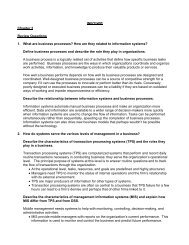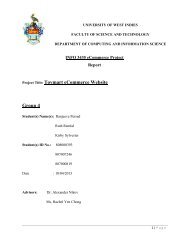Information systems and organisational issues
Information systems and organisational issues
Information systems and organisational issues
- No tags were found...
You also want an ePaper? Increase the reach of your titles
YUMPU automatically turns print PDFs into web optimized ePapers that Google loves.
Agency theoryThe Agency Theory of the Impact of<strong>Information</strong> Technology on the Organization•Firm is nexus of contracts among self‐interestedparties requiring supervision•Firms experience agency costs (the cost of managing<strong>and</strong> supervising) which rise as firm grows•IT can reduce agency costs, making it possible forfirms to grow without adding to the costs ofsupervising, <strong>and</strong> without adding employees25 © Prentice Hall 2011 3-25FIGURE 3-7As firms grow in size <strong>and</strong> complexity, traditionally they experience risingagency costs. 26 © Prentice Hall 2011 3-26Organizational <strong>and</strong> behavioral impactsFlattening Organizations•IT flattens organizations– Decision making pushed to lower levels– Fewer managers needed (IT enables faster decisionmaking <strong>and</strong> increases span of control)• Postindustrial organizations– Organizations flatten because in postindustrialsocieties, authority increasingly relies on knowledge<strong>and</strong> competence rather than formal positions<strong>Information</strong> <strong>systems</strong>can reduce the numberof levels in anorganization byproviding managerswith information tosupervise largernumbers of workers<strong>and</strong> by giving lowerlevelemployees moredecision-makingauthority.FIGURE 3-827 © Prentice Hall 2011 3-2728 © Prentice Hall 2011 3-28
















